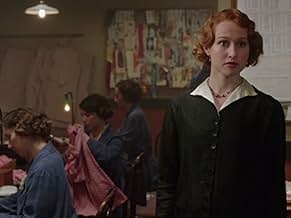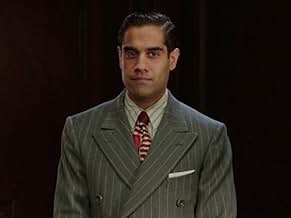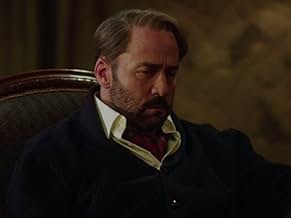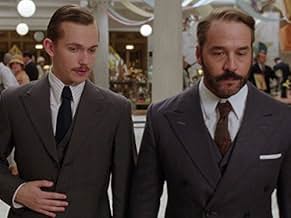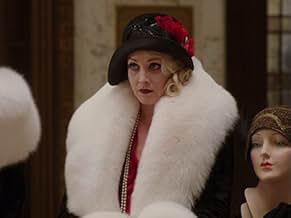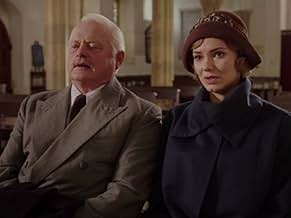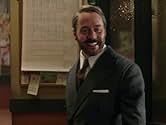Relata a história da vida real do visionário fundador americano da Selfridge's, a loja de departamentos de Londres.Relata a história da vida real do visionário fundador americano da Selfridge's, a loja de departamentos de Londres.Relata a história da vida real do visionário fundador americano da Selfridge's, a loja de departamentos de Londres.
- Indicado para 1 Primetime Emmy
- 1 indicação no total
Explorar episódios
Avaliações em destaque
When I saw this series advertised, I thought- Ah yes, another period series. Don't get me wrong, I absolutely love series set decades (or in this case, a century) ago. However, in recent times, with the growth in number of these shows, I worry that some are churned out lacking the necessary quality and are present more as an exhibition of period clothing than exceptional story lines. This show, however, was just excellent in my opinion. It challenges viewers whilst capturing the time period. The characters are all divine in their ways. One even finds a place in their hearts for the least desirable characters on the show. I think Mr Selfridge, as well as Call the Midwife, should be ranked and awarded as highly as Oscar-winning Mad Men. Mr Selfridge surpasses expectations by tenfold. For viewers reading this review, who agree with my appreciation of Mr Selfridge, I also recommend Call the Midwife.
As the old saying goes.. What the previous bad reviewers of this series are watching or expect, god alone knows!! This really is an excellent series! Brilliant acting, well scripted and directed and a great story to boot! Also, regarding Jeremy Priven, I personally think he is perfect playing the roll of the flamboyant American entrepreneur in a rather stayed post Edwardian London. Bearing all this in mind,Please don't allow the tiny number of pathetic, sad, need a life, armchair critics on here sway you from watching it. As you can certainly see yourself from the amount of people who truly don't agree their comments,they are definitely in the minority on this one!
'Mr Selfridge' (PBS)
The great American playwright Neil Simon, in his memoir "Rewrites," recalls that he was on the brink of "replacing" the late actor Jerry Orbach in the Broadway musical "Promises, Promises," when suddenly, Orbach seemed to pull a performing rabbit out of the hat and became absolutely brilliant in the part. The show, an adaptation of the 1960 Oscar-winning film, "The Apartment," had 1,281 performances from December of 1968 to January of 1972, and Orbach won the Tony Award as Best Actor for his performance. I was reminded of this as I watched Jeremy Piven in the title role of the PBS drama series, "Mr Selfridge," which has just begun its second season. The series, a British period piece about Henry Gordon Selfridge, the American who came to London and opened his department store, Selfridge & Co., at the beginning of the 20th century, has clearly been a class production since the moment it premiered (January 6, 2013 in the United Kingdom and March 30, 2013 in the United States). What I was less certain about was Piven. He didn't, at first, seem up to the task of matching stride for stride a cast that was chock-full of fine British actors. My suspicion is that he himself was questioning his abilities. But he had his moments, enough to have hope for him in the second season. He's now proved, as the next go-round gets underway, that like Orbach, he possesses a deep reservoir of talent that has allowed him to pull the performing rabbit out of the hat, doing not only a capable job, but an outstanding one, certainly worthy of consideration when awards season rolls around. Like the Selfridge character itself, a man who matured and evolved from a philandering husband and mercurial businessman to a steady spouse and solid leader, Piven also has grown, delving into the many sides of a truly prismatic man, as complex as he was brilliant, with a sure hand that reveals an actor who knows what he is doing and mesmerizes in the process. The series itself is knee-deep in colorful quality, depicting the landmark Selfridge department store and the period in which it was born with a brilliance that both captivates and explains. The supporting cast is superb _ Frances O'Connor as Selfridge's beleaguered wife, Rose, Aisling Loftus as the blossoming young woman and retail whiz Agnes Tower, Gregory Fitoussi as Selfridge's best friend and business confidant Henri Leclair, Amanda Abbington as the emotionally fragile sales head Miss Mardle (it's nearly impossible to imagine Abbington as the icy, assured Mary Morstan that she so effectively portrays in the BBC's hit series, "Sherlock"), Tom Goodman-Hill as the sad personnel head Mr. Grove, Ron Cook as the ever-dependable right hand man Mr. Crabb, and on an on. But without an effective Piven as Selfridge, the foundation of this universe would crumble. Especially now. The plot is beginning to thicken, as they say, with World War I on the horizon. Complex issues, plots and characters obviously await. It's clear that Piven, as Orbach did decades ago on Broadway, has found his sweet spot with his character. And as with "Promises, Promises," the sky's the limit for "Mr Selfridge."
The great American playwright Neil Simon, in his memoir "Rewrites," recalls that he was on the brink of "replacing" the late actor Jerry Orbach in the Broadway musical "Promises, Promises," when suddenly, Orbach seemed to pull a performing rabbit out of the hat and became absolutely brilliant in the part. The show, an adaptation of the 1960 Oscar-winning film, "The Apartment," had 1,281 performances from December of 1968 to January of 1972, and Orbach won the Tony Award as Best Actor for his performance. I was reminded of this as I watched Jeremy Piven in the title role of the PBS drama series, "Mr Selfridge," which has just begun its second season. The series, a British period piece about Henry Gordon Selfridge, the American who came to London and opened his department store, Selfridge & Co., at the beginning of the 20th century, has clearly been a class production since the moment it premiered (January 6, 2013 in the United Kingdom and March 30, 2013 in the United States). What I was less certain about was Piven. He didn't, at first, seem up to the task of matching stride for stride a cast that was chock-full of fine British actors. My suspicion is that he himself was questioning his abilities. But he had his moments, enough to have hope for him in the second season. He's now proved, as the next go-round gets underway, that like Orbach, he possesses a deep reservoir of talent that has allowed him to pull the performing rabbit out of the hat, doing not only a capable job, but an outstanding one, certainly worthy of consideration when awards season rolls around. Like the Selfridge character itself, a man who matured and evolved from a philandering husband and mercurial businessman to a steady spouse and solid leader, Piven also has grown, delving into the many sides of a truly prismatic man, as complex as he was brilliant, with a sure hand that reveals an actor who knows what he is doing and mesmerizes in the process. The series itself is knee-deep in colorful quality, depicting the landmark Selfridge department store and the period in which it was born with a brilliance that both captivates and explains. The supporting cast is superb _ Frances O'Connor as Selfridge's beleaguered wife, Rose, Aisling Loftus as the blossoming young woman and retail whiz Agnes Tower, Gregory Fitoussi as Selfridge's best friend and business confidant Henri Leclair, Amanda Abbington as the emotionally fragile sales head Miss Mardle (it's nearly impossible to imagine Abbington as the icy, assured Mary Morstan that she so effectively portrays in the BBC's hit series, "Sherlock"), Tom Goodman-Hill as the sad personnel head Mr. Grove, Ron Cook as the ever-dependable right hand man Mr. Crabb, and on an on. But without an effective Piven as Selfridge, the foundation of this universe would crumble. Especially now. The plot is beginning to thicken, as they say, with World War I on the horizon. Complex issues, plots and characters obviously await. It's clear that Piven, as Orbach did decades ago on Broadway, has found his sweet spot with his character. And as with "Promises, Promises," the sky's the limit for "Mr Selfridge."
I'm a late arrival to this true gem of a series, giving me the distinct benefit and joy of watching back-to-back episodes in a binge viewing. Frankly, my initial reaction was "what could be interesting about a department store?" I'm glad I went with a friend's recommendation and had a view.
Mr. Selfridge is a finely handled period piece which continues the tradition of exceptional British drama. Jeremy Piven is an inspired choice for Mr. Selfridge, showing his dramatic chops once again in a difficult and demanding role. I've often thought Mr. Piven had more to show us, and this series gives him the opportunity.
As well, the rest of the cast is strong and well-defined. It didn't take long to get hooked into the varied tribulations, trials and triumphs of the characters.
As a confirmed Downton Abbey fan, I thought this series would be a pale copy. I was wrong. It holds it's own very well. The challenge of balancing the factual aspects of Selfridge's history with the fictional, yet realistically painted accounts of the people behind the store, has been very capably managed by the writers. The drive, innovation, quality and forward thinking of the actual Selfridge has been captured here in a way that makes the viewer see how astonishing and astute Selfridge the businessman was.
Kudos to everyone involved. And the theme music for the series is truly inspired. Every time I hear it, I want to shop.
Mr. Selfridge is a finely handled period piece which continues the tradition of exceptional British drama. Jeremy Piven is an inspired choice for Mr. Selfridge, showing his dramatic chops once again in a difficult and demanding role. I've often thought Mr. Piven had more to show us, and this series gives him the opportunity.
As well, the rest of the cast is strong and well-defined. It didn't take long to get hooked into the varied tribulations, trials and triumphs of the characters.
As a confirmed Downton Abbey fan, I thought this series would be a pale copy. I was wrong. It holds it's own very well. The challenge of balancing the factual aspects of Selfridge's history with the fictional, yet realistically painted accounts of the people behind the store, has been very capably managed by the writers. The drive, innovation, quality and forward thinking of the actual Selfridge has been captured here in a way that makes the viewer see how astonishing and astute Selfridge the businessman was.
Kudos to everyone involved. And the theme music for the series is truly inspired. Every time I hear it, I want to shop.
As a Downton Abbey fan, completely out of episodes to watch, I was grateful to have Mr. Selfridge to turn to. With a week of completely free-form time on my hands I wanted the great luxury of spending a decadent number of consecutive hours consuming an entire season of shows in one sitting, night after night. Mr. Selfridge filled the bill beautifully. Oh, it is pretty light and with a few dropped threads, but no matter, I was happy from the opening score. The characters are easy to develop an affection for, especially Mr. Harry Selfridge. Over the course of the three seasons you witness a man rising to the top of his game, operating a large department store in turn of the 20th century London. Typical birth-life-death situations, plus the extraordinary game changer of World War One, unfold in the lives of Harry, his family and selected employees. Throughout it all, important lessons are learned, while the bad actors ultimately get their comeuppance. One unexpected dimension was the historical look at the development of department store marketing. While not presented in- depth, there was sufficient homage paid to innovations risked by Mr. Selfridge to give a good insight into the evolution of retailing. Window dressers in particular will love the series!
Você sabia?
- CuriosidadesWhen Rose Selfridge meets Roderick Temple at the National Gallery, she fibs and tells him her last name is Buckingham. In fact, the real Rosalie Selfridge was named Buckingham before her marriage to Harry Gordon Selfridge. The Buckingham family was very prominent in Rosalie's native Chicago, and relatives of Rosalie gave the funds for the enormous Buckingham Fountain in Grant Park, which is still one of Chicago's best-known public landmarks.
- ConexõesFeatured in The Wright Stuff: Episode #18.5 (2013)
Principais escolhas
Faça login para avaliar e ver a lista de recomendações personalizadas
- How many seasons does Mr Selfridge have?Fornecido pela Alexa
Detalhes
Contribua para esta página
Sugerir uma alteração ou adicionar conteúdo ausente






